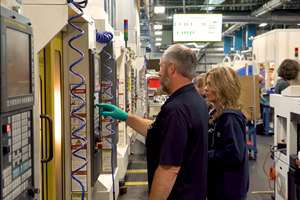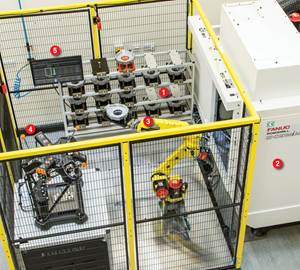What Is an IIoT Platform?
The foundation of data-driven manufacturing is an IIoT platform: the hardware and software package that connects devices and equipment and enables management of data flows and applications.
Share




An IIoT platform is a set of hardware and software facilities that assist and support applications for industrial companies using the internet to connect devices and equipment. This use of the internet is now commonly called the Industrial Internet of Things (IIoT). Such platforms may provide an operating environment, computer processing capability, data storage structure and program building blocks for application developers. GE’s Predix is an IIoT platform designed for a broad range of industries, including manufacturing. Siemens’ MindSphere also covers manufacturing, including processes on CNC machine tools. There are many other IIoT platforms that are available or in development. Most are cloud-based, meaning they rely on remote computer resources shared by many users and accessed via the internet.
As shops and plants connect machines and systems to internet-enabled networks, they will have to understand how these platforms can be key components of their IIoT implementation plans. Let’s step back for a minute to remember that platforms and applications are not difficult terms to understand. For example, I have a workbench in my basement and one in my garage. Literally, these are the platforms on which I work on my hobby projects. By design, each of these platforms is best suited for certain kinds of tasks. The basement workbench is set up for small projects such as assembling model kits. The garage workbench is handy for bigger projects that involve two-by-fours or sheets of plywood. Likewise, the tools, storage compartments and lighting fixtures at each platform are appropriate for the particular project activities conducted there. These activities, such as gluing details on a miniature boxcar or miter cutting strips of molding to dress up a new countertop, are “applications” that work best given the configuration and facilities at each platform.
By analogy, an IIoT platform is set up to take advantage of internet connectivity and provide applications for the kinds of tasks that networking equipment makes possible. Manufacturing companies will need an IIoT platform designed for networks of production systems and machine tools. Here are a few examples of how an IIoT platform benefits these companies:
- Data handling. A single CNC machine tool generates thousands of signals a second, representing every action of its processors and the electromechanical components they control. All of these signals could be captured, codified and sent over the internet. An IIoT platform would manage the flow of this data and provide databases specifically configured for this type of data so it can be stored and retrieved efficiently, enabling every connected device to stream data for analysis. Protecting the security and privacy of data is another function the platform provides.
- Special applications. An IIoT platform can host applications tailored to the needs of specific groups of users, such as shops with CNC machines. For example, Siemens’ MindSphere application, Manage MyMachines, monitors machine status and helps improve maintenance. Because this application is intended to bring in data from machines with controls other than its own, the company provides software tools developers can employ to streamline interoperability. One tool for this might be a library of adapters or translators easily modified for almost any brand, vintage or type of machine control.
- Computing power. The potential to garner insights from masses of machine-generated data is barely being realized. This is the realm of Big Data: the ability to find significant trends or emerging patterns detectable only by rapidly scanning many millions of data items. An IIoT platform can bring to bear the processing capability necessary to handle tasks at this level.
For example, this capability is required to link process monitoring and condition diagnostics across a large number of machine tools and machine components. Predictive maintenance, process optimization, part traceability and comprehensive lifecycle management become more powerful as a result.
Related Content
Process Control — Leveraging Machine Shop Connectivity in Real Time
Renishaw Central, the company’s new end-to-end process control software, offers a new methodology for producing families of parts through actionable data.
Read MoreLeveraging Data to Drive Manufacturing Innovation
Global manufacturer Fictiv is rapidly expanding its use of data and artificial intelligence to help manufacturers wade through process variables and production strategies. With the release of a new AI platform for material selection, Fictive CEO Dave Evans talks about how the company is leveraging data to unlock creative problem solving for manufacturers.
Read MoreShop Quotes Smarter, Works Harder with Machine Monitoring
Temco first installed MT-LINKi to optimize quoting. Now, the software helps the shop optimize its machines — and machine purchases.
Read More5 Stages of a Closed-Loop CNC Machining Cell
Controlling variability in a closed-loop manufacturing process requires inspection data collected before, during and immediately after machining — and a means to act on that data in real time. Here’s one system that accomplishes this.
Read MoreRead Next
Building Out a Foundation for Student Machinists
Autodesk and Haas have teamed up to produce an introductory course for students that covers the basics of CAD, CAM and CNC while providing them with a portfolio part.
Read MoreSetting Up the Building Blocks for a Digital Factory
Woodward Inc. spent over a year developing an API to connect machines to its digital factory. Caron Engineering’s MiConnect has cut most of this process while also granting the shop greater access to machine information.
Read More5 Rules of Thumb for Buying CNC Machine Tools
Use these tips to carefully plan your machine tool purchases and to avoid regretting your decision later.
Read More























.jpg;maxWidth=300;quality=90)








